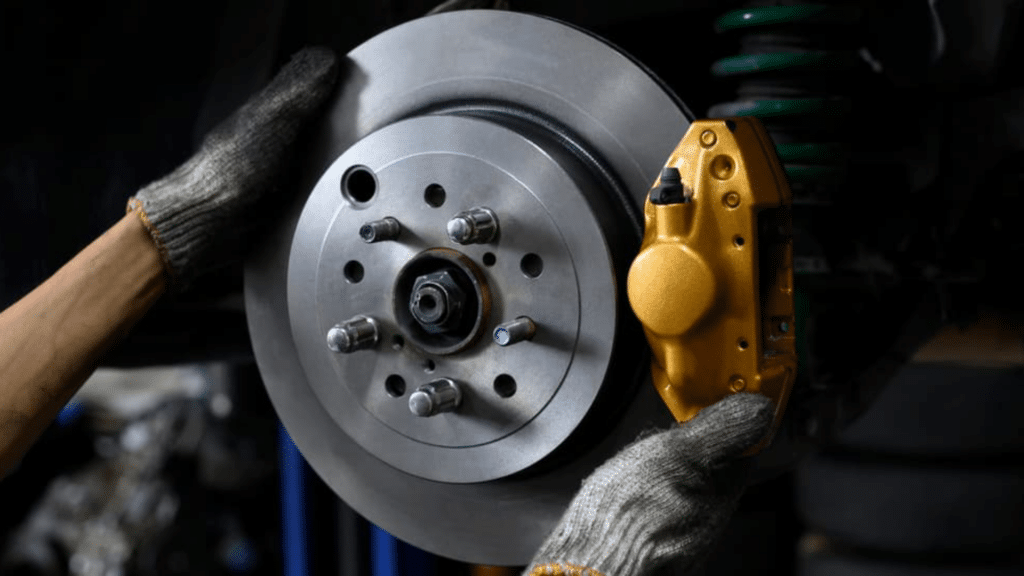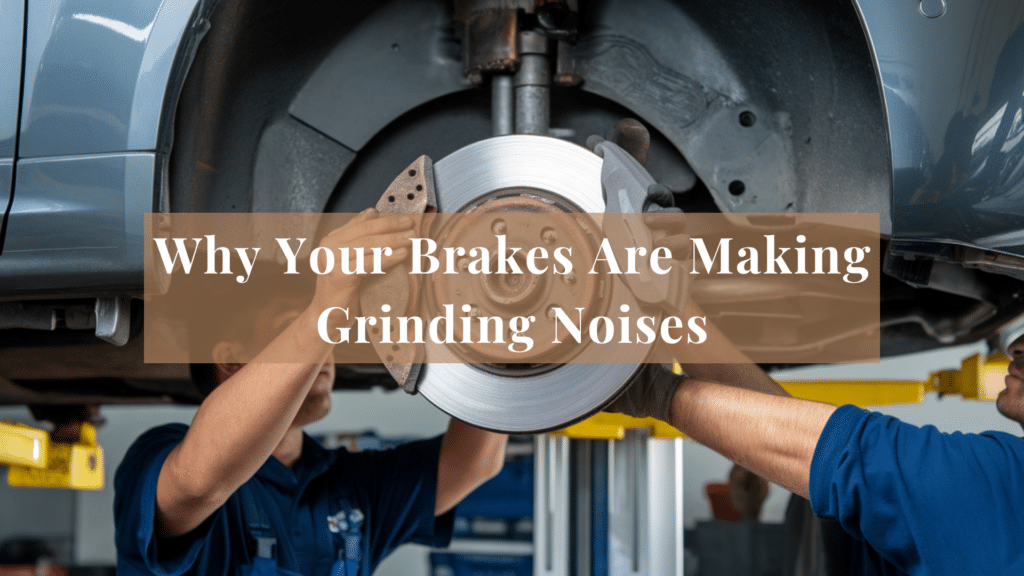If you hear a grinding noise when you apply your brakes, it’s important not to ignore it. This sound is usually a sign that something isn’t quite right with your braking system and can affect your safety on the road.
Brakes are one of the most crucial parts of your vehicle, so keeping them in good condition is essential. A grinding noise often means that the brake pads are worn down, or there might be an issue with other brake components like the rotors or calipers.
In this blog, you can look at the common causes of brake grinding noises, how to fix them, and when to seek help from a mechanic. Addressing the problem early can save you money and keep you safe, so let’s start.
What Does a Grinding Noise from Brakes Mean?

A grinding noise when you apply your brakes usually means something isn’t right with your braking system. Most often, it happens when your brake pads are worn down.
Brake pads are designed to press against the rotors to help stop your car, but over time, they wear out. When they get too thin, metal parts start to touch the rotor, causing that annoying grinding sound.
Other reasons for the noise could be damaged rotors, foreign objects stuck between the brake parts, or problems with the brake calipers. Ignoring this sound can lead to more damage, like wearing down your rotors or affecting your car’s ability to stop properly. It’s important to take action when you hear it to avoid bigger, more expensive problems later.
Common Causes of Brake Grinding Noises
If you hear grinding noises when you brake, it’s a sign that something in your braking system needs attention. Here are some of the most common reasons why this happens:
1. Worn Brake Pads
One of the most common causes is worn brake pads. Over time, the pad material gets thinner from rubbing against the rotors. When they’re too thin, metal parts of the pads may start rubbing directly against the rotor, creating that grinding sound. If this happens, the pads must be replaced to avoid damaging other braking system parts.
2. Warped or Damaged Rotors
The rotors are the round, flat discs that the brake pads press against to slow down the vehicle. If the rotors are warped or damaged, they don’t make proper contact with the pads, causing the brakes to grind. This can happen from regular wear or if the rotors are exposed to extreme heat from hard braking.
3. Foreign Objects in the Brake System
Sometimes, small debris like rocks, gravel, or dust can get caught between the brake pads and rotors. This can cause a grinding noise every time you brake. This issue can usually be fixed by cleaning the brake system and removing any debris.
4. Seized Brake Calipers
The brake calipers are the parts that hold the brake pads and press them against the rotors. If the calipers become stuck or seized, they might not release properly, causing the pads to stay in contact with the rotor even when you’re not braking. This can lead to a constant grinding sound. Seized calipers may need to be repaired or replaced to fix the issue.
5. Worn or Damaged Wheel Bearings
Wheel bearings help the wheels spin smoothly. If these bearings wear out or get damaged, they can cause the wheel to wobble or move unevenly. This can lead to misalignment with the brake pads, causing the pads to grind against the rotor. Worn wheel bearings need to be replaced as soon as possible to avoid further damage to the brakes.
6. Lack of Lubrication
Certain parts of the braking system, like the caliper bolts, need proper lubrication to move smoothly. If these parts get dry, they can seize up, which can cause the brake pads to rub against the rotor in the wrong way, creating a grinding noise. Keeping these parts properly lubricated can help prevent this problem.
If you hear grinding noises, it’s important to get your brakes checked out soon. Ignoring the issue can cause more damage and affect your safety on the road.
If you’re hearing grinding noises when braking, fixing the problem quickly is important. Ignoring it can lead to more damage and costlier repairs down the road. Here’s a step-by-step guide to fixing common causes of brake grinding noises:
1. Replace Worn Brake Pads
If your brake pads are worn out, they need to be replaced. Here’s how:
- Step 1: Jack up your car and remove the wheels to access the brake pads.
- Step 2: Remove the old brake pads. Depending on your car, you may need to unbolt the caliper or use a special tool.
- Step 3: Install new brake pads. Make sure they’re the right fit for your car model.
- Step 4: Reassemble the brake components and put the wheels back on.
Replacing brake pads is easy, but make sure you use high-quality pads for better performance and safety.
2. Resurface or Replace Damaged Rotors
If the rotors are damaged or warped, they may need to be resurfaced or replaced. Here’s what you need to do:
- Step 1: Remove the wheel and inspect the rotors for cracks, deep grooves, or warping.
- Step 2: If the damage is minor, a mechanic can resurface the rotors to make them smooth again.
- Step 3: If the rotors are too worn, they’ll need to be replaced. This involves replacing the old rotors.
Warped rotors can cause your car to shake or feel unsteady, so make sure to fix them right away.
3. Clear Debris from the Brake System
If something like a small stone or dirt is stuck between the brake pad and rotor, you can fix it yourself:
- Step 1: Remove the wheel and inspect the brake system for any debris.
- Step 2: Carefully remove rocks or dirt using a small brush or air compressor.
Cleaning your brakes regularly can help prevent debris from getting stuck and causing damage.
4. Repair or Replace Brake Calipers
If the brake calipers are sticking or not releasing properly, they can cause grinding noises. You may need to replace them:
- Step 1: Lift the car and remove the wheel.
- Step 2: Unbolt the caliper and check if it moves smoothly. If it’s stuck, it may need lubrication or, in some cases, replacement.
- Step 3: Install a new caliper if necessary and reassemble the brake parts.
If you’re unsure about your calipers’ condition, having a mechanic inspect them is a good idea.
5. Replace Worn Wheel Bearings
If worn wheel bearings are causing grinding noises, you’ll need to replace them. This is a more complicated repair, so it’s best done by a mechanic:
- Step 1: The mechanic will remove the wheel and inspect the bearings.
- Step 2: If the bearings are bad, they’ll be replaced with new ones.
Bad wheel bearings can affect your car’s handling, so it’s important to fix them quickly.
6. Lubricate Brake Components
Sometimes, grinding noises happen because the brake components, like the caliper bolts, aren’t properly lubricated. Here’s how to fix that:
- Step 1: Remove the brake calipers and clean the parts.
- Step 2: Apply brake lubricant to the moving parts, like the caliper bolts, ensuring smooth movement.
- Step 3: Reassemble the brakes and test them.
If you’ve tried fixing the grinding noise yourself and the problem persists, it’s time to call a mechanic. Sometimes, brake issues can be more complex, and a professional will have the right tools to diagnose and fix the problem.
When to Get a Mechanic to Check Your Brakes
Sometimes, fixing a brake grinding noise is a job you can do yourself, but other times, it’s best to call in a professional. Here are some signs that it might be time to seek help from a mechanic:
1. You Can’t Figure Out the Cause: If you’ve checked the brake pads, rotors, and other parts but still can’t find the problem, a mechanic can help. They have the experience and tools to diagnose issues that might be hard to spot.
2. You’re Not Comfortable Doing the Work: Brake repair can sometimes be tricky, and if you’re unsure how to replace parts or fix the issue, getting professional help is a good idea. You want to make sure the brakes are working properly.
3. The Grinding Noise Persists: A mechanic can take a closer look to figure out if there’s something else wrong, like damaged rotors or calipers.
4. You Notice Other Brake Problems: If the grinding noise is accompanied by other issues, like your car pulling to one side, shaking, or reduced braking power, it’s time to call a mechanic.
If you’re ever in doubt, don’t hesitate to contact a professional. Brakes are too important to risk getting wrong, and a mechanic can ensure your car is safe and working properly.
Conclusion
Hearing a grinding noise when you brake is something you shouldn’t ignore. It’s usually a sign that something is wrong with your braking system, and if left unaddressed, it can lead to more serious damage.
Worn brake pads, damaged rotors, and even stuck calipers are common causes. While some of these issues are easy to fix on your own, others may require a professional mechanic’s help.
If you’re unsure about the cause or don’t feel comfortable making the repairs yourself, it’s always best to seek professional assistance. A mechanic can help you identify the exact issue and ensure your brakes are in good condition.
Remember, your brakes are one of the most important parts of your car, and keeping them in top shape is essential for your safety. So, don’t wait too long—get your brakes checked as soon as possible to keep your car running smoothly and safely.
Frequently Asked Questions
Can I drive with grinding brakes?
Driving with grinding brakes is not recommended. It can damage other brake components like the rotors and reduce your car’s braking power, making it unsafe. It’s best to address the problem immediately.
Can dirt cause brake grinding noises?
Yes, small debris like dirt or gravel can get stuck between the brake pad and rotor, causing a grinding noise when you brake. Removing the debris can usually stop the sound.
How much does it cost to fix grinding brakes?
The cost to fix grinding brakes depends on the issue. Replacing brake pads may cost $100-$300, while rotor resurfacing or replacement can range from $150-$500. Professional mechanic fees vary by location and vehicle type.
How do I prevent brake grinding?
To prevent brake grinding, replace your brake pads before they wear down too much, avoid heavy braking, and maintain your brake system with regular checks.

